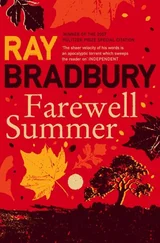“I love her,” he thought, and was surprised. “It’s ridiculous, but I love her.”
He knew how her voice must be, very gentle and kind, and how she would be and act, anywhere, at any time. It was in her dark eyes and in the way her hands touched everything, with a careful consideration. And then the pale light in her face glowed out upon things, it did not burn in upon herself and feed upon herself. It nourished others. It illumined the bus. It reflected the world and himself.
“Do you know?” he thought to her image in the mirror. “I love you? Do you suspect?”
They rode in the summer streets, toward midnight.
AND THEN he knew. Inside each man, though he did not know it, nor ever considered it, was the image of the woman he someday must love. Whether she was composed of all the music he had ever heard or all the trees he had ever seen or all the friends of his childhood, certainly no one could tell. Whether the eyes were his mother’s, and the chin that of a girl cousin swimming in a summer lake twenty-five years ago, this was unknowable also. But most men carried this image, like a locket, like a pearl-cameo, in their head a lifetime, taking it out only rarely, taking it out never, after marriage, afraid then to compare it to the reality. And most men never saw the woman they would love anywhere, in the dark theatre, in a book, or passing on the street. They saw her only after midnight when the city was asleep and the pillow was cool under their heads. And she was a composite of all dreams and all women and every moonlit night since the calendar began.
“SHALL I tell you now?” he thought. “Do I dare?”
Now she had closed her eyes and leaned back to think of how this evening had been to her.
“If only you knew,” he thought, and then the panic grew in him. There were only nine more stops. Somewhere along the way she would ring the buzzer and step out into the night and be gone. Somewhere ahead he would have to cry out suddenly, or be silent,
“My name is William Becket, what’s yours? Where do you live? Can I see you again?”
Eight stops. She was shifting in her seat and watching the streets. “My name is William Becket, and I love you,” he thought.
She raised her hand to the cord.
“No,” he thought.
THE BUZZER rang. She arose as he slowed the bus toward its stop. He could come back in the morning, of course, to this stop. He could stand here and wait for her to come by, and say to her...and say to her...
His face was jerking now, a bit, up toward the mirror, down toward the avenue and the moon was very lovely in the trees. He knew he could not come here in the morning.
He stopped the bus and she was waiting at the door. Waiting for him to open it. He paused a moment and said, “I—”
She half-turned and looked at him with her beautiful face, the face that was everything he had ever thought about at night walking by the sea, in his free time.
He pressed the air-release, the door hissed open, she stepped out and was walking in the leafy moonlight.
I don’t even know her name, he thought, I never even heard her voice. He kept the door open and watched her move off down the dark street. I didn’t even see if she was married, he thought.
He closed the door and started the bus off and away, very cold now, his hands trembling on the wheel, not quite able to see where he was driving. After a moment he had to stop again and put down all the windows, there was too much draught. Half an hour later, coming back along this same street, he was rushing his bus too fast, for the avenues were empty and there was only the moon and the empty bus behind his back, and he was hurrying, hurrying, thinking to himself, if I hurry I’ll reach the sea and if I’m lucky, it all depends, there may be some phosphorescence left, and there’ll be time for a smoke and a walk before I turn the bus around and come back empty through the empty town.
IN THE ROOM, the deaths came and went. They were on all lips, and in every eye. Coffee cake went in and down to feed the stomach that kept the lungs busy with the talk of death. Coffee was creamed in cups and sugar sweetened the spell of old mortality in the parlor room. The four people faced each other, eager with stories of who and how and why, with names, dates and figures, with conditions and fortitudes, with descriptions of agonies and midnight sweats, of sutures and fractures, of comas and trachomas.
Mrs. Hette lifted her fat well-fed hand with the coffee cake in it like the contents of a steam-shovel. She paused in the death agony of Mr. Joseph Lantry, her best friend. She widened her mouth, showed the gray gums of her false teeth, faintly rimed with a froth, and bit into that cake. Chewing, swallowing, her eyes ugly bright, she continued with each detail of Mr. Lantry’s death. He had spat blood upon the ground. He had coughed, making the noise of a chimney flue during a winter storm, vacuous and empty and horrible. He had had the red leaf of mortality across his cheeks. Her voice went up, up. Then, with his death, she fell back in her chair, shaking her head, closing her eyes, not understanding life with her usual I-don’t-understand-life voice. Raising her food to her mouth she rained clods and crumbs of earth and coffee cake down upon Mr. Lantry’s coffin.
“Poor Mr. Lantry,” said Mrs. Spaulding, across the dim room.
“Yes,” said Mr. Spaulding.
“That’s how it goes,” said Mr. Hette, stirring his black coffee.
They all waited the proper interval. A little watch ticked inside Mrs. Hette; somehow she always knew the right interval before going on with something else. You had to lay the dead out properly, with words and silences, before you went on to the next, alphabetical or not. With a shuttering of eyes and a resting of hands about your coffee plate you showed that it was a subject of much solemnity and worry to you.
Mrs. Spaulding took advantage of the pause to offer more cake to everyone.
Mr. Hette sucked his pipe. “Do you know how long since we last seen you people? Twenty years. Traveling and all. When we hit town today we didn’t think we’d find you robbers alive !” Everybody laughed; it was nice to frost death up a bit. “What’s happened in town since we left?”
“Remember Bill Samuelson? He died.”
“What of?”
“Pneumonia,” said Mr. Spaulding.
“Diphtheria,” said Mrs. Spaulding.
Mr. Spaulding looked at Mr. Hette. “Helen Ferry, Tom Foley, Henry Masterson, all them died.”
“What ever happened to—ah—Alaine Phillips?” Mr. Hette looked cautiously from the corners of his eyes, at his wife. His wife’s eyes snapped.
“Alaine Phillips?” said Mr. Spaulding. “Why, didn’t you hear ? She was divorced the spring after you married Lita here, and went away to Ohio.”
“Oh,” said Mr. Hette.
Mr. Hette’s wife glared at him.
“Alaine died the next year, however,” added Mr. Spaulding.
“What!” cried Mr. Hette.
Mrs. Hette smiled over at the wall briefly, taking out her hankie to tap her nose. The hankie made it hard for Mr. Hette to see her mouth now. He sat looking at the carpet.
Now the two women took up the brisk routine of names.
Gussie Soderstrom? Alive. Well! Berenice Holdridd? Dead. Well ! Talita Martin? Dead! Really ? There were gasps where ever someone had fallen away; little laughs and wonders where ever a tree still stood, leafed and healthy. Mildred Partridge! Lily Johnson? Elna Sundquist? Dead, dead, dead.
Mrs. Hette, in the person of one Sylvia Gamwell, wandered into a chain drug store, lifted pieces of poison cream pie to her mouth, went out to wait for a bus and dropped dead, necessitating an autopsy attended by Mr. Hette, and Mr. and Mrs. Spaulding. All organs were minutely examined and found to be so heavily tainted with that kind of poison from cream pies left long in the sun, that the organs gave off a phosphorescent aura, like the breath of a dragon. Mrs. Hette’s simulation of Miss Gamwell’s death agony was something that brought everybody out to the edge of the sofa.
Читать дальше
Конец ознакомительного отрывка
Купить книгу










